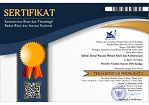Poligami menurut Nasr Hamid Abu Zayd: studi atas pengaruh pemikiran tafsir terhadap penetapan hukum
Abstract
This article examines Nasr Abu Zayd’s (d. 2010) thought of tafsir and takes a close look at its implementation when he interprets “polygamy verses”. With library research method and content analysis, I conclude that Abu Zayd uses thematic method of interpretation, by using contextual analysis approach. This method is similar to Fazlur Rahman’s Double Movement method. Abu Zayd’s contextual interpretation theory (al-qira’ah al-siyaqiyyah) operates in the following steps; first, turn to the meaning (ma’na) of the text in its historical and cultural context (tarikhiyyat al-dalalah); and second, implement its significance (maghza) in contemporary context. Based on his contextual analysis (al-qira’ah al-siyaqiyyah) to polygamy verses, Abu Zayd concludes that polygamy is not the final purpose Islamic teaching (shari’ah al-Islamiyah). Polygamy is a temporal decision which is related to the very tight prerequisites. According to him, the significance (maghza) of the Qur’an text talking about polygamy is however justice and equality. Otherwise, Abu Zayd says that the implicit (maskut ‘anhu) final purpose of the revelation of “polygamy related-verses” are monogamy.
Keywords
Full Text:
PDFReferences
Akhtar, Syed H. Islam the Misunderstood Religion in the West, dalam: http://www.islamquery.com/
documents/Islam%20the%20Misunderstood%20Religion.pdf.
Chapman, Samuel. polygamy, Bigamy and Human Rights law. USA: Xlibris Corporation, 2001.
Essack, Farid. The Qur’an: A User’s Guide, Oxford: Oneworld Publication, 2007.
Farmawi, Abdul Hayy al-. Al-Bidaya fi Tafsir al-Maugdu‘i. Kairo: Dar Kutub, 1977.
Freyyer, Barbara, “The Hijab: How Curtain Became an Institution and a Cultural Symbol,”
dalam Asma Asfaruddin dan AHM Zahniser. Indiana: Eisenbrauns, 1997. 67-104.
Freyyer, Barbara, “Gender Issues and Contemporary Qur’an Interpretation,” dalam Islam,
Gender & Social Change. Yvonne Yazbeck Haddad & John L. Esposito, (New York:
Oxford University Press, 1998), 30-44.
Hanafi, Hasan. al-Yamin wa al-Yasar fi al-Fikr al-Dini, Mesir: Madlubi, 1989.
Hasan, Riffat, “Feminisme dan al-Qur’an” dalam Jurnal Ulumul Qur’an Vol 2. 1990.
Hoffman, “Polemics on Modesty and Segregation of Women in Contemporary Egypt,”
International Journal of Middle East Studies 19, 1987.
Karim, Kevin el-. dalam: http://www.answering-islam.com/karim/part_3_o.pdf. Diakses
pada Senin, 22 April 2013.
Kühn, Brittany, Universal Human Rights vs. Traditional Rights. dalam Topical Review Digest:
Human Rights In Sub -Saharan Africa. dalam: http://www.du.edu/korbel/hrhw/
researchdigest/africa/UniversalHumanRights.pdf. Diakses pada Senin, 22 April 2013.
Ichwan, Moch Nur. A New Horizon in Qur’anic Hermeneutics: Nasr Hamid Abu Zayd’s Contribution
to Critical Qur’anic Scholarship. M.A. Thesis. Leiden: University, 1999.
McDonough, Sheila, “Modern Muslim Qur’an: Commentaries in relation to Gender Roles
and Distinction,” Religious Srudies and Theology. May-Sept 1987: p. 56-69.
Mernissi, Fatima dan Riffat Hasan. Setara di Hadapan Allah: Relasi Laki-laki dan Perempuan
dalam Tradisi Islam Pasca Patriarkhi. Yogyakarta: Yayasan Prakarsa, 1995.
------------------, “Equal Before Allah.” dalam The Commite on South Asian Womens Bulletin, Vol. 4.
Mustaqim, Abdul. ed. Studi al-Qur’an Kontemporer (Wacana Baru Berbagai Metodologi Tafsir).
Yogyakarta: Tiara Wacana Yogya, 2002.
Nurmila, Nina. Women, Islam and Everyday Life: Renegosiating Polygamy in Indonesia Oxon:
Routledge, 2009.
Rahman, Fazlur. Islam. USA: University of Chicago Press, 1979.
Rahman, Yusuf. The Hermeneutical Theory of Nasr Hamid Abu Zayd. PhD Dissertation. Montreal:
McGill University, 2001.
Rubin, Paul H. Democracy, Dictatorship, and Polygamy, dalam http://www.cato.org/pubs/regulation/
regv31n2/v31n2-noted.pdf. Diakses pada Senin, 22 April 2013.
Shah, Prakash. Attitudes to Polygamy in English law, University of Kent at Canterbury, 2003.
Sukidi. “Nasr Hamid Abu Zayd and the Quest for a Humanistic Hermeneutics of the
Qur’an”, dalam Die Welt des Islams 49, 2009.
Stowwaser, Barbara Freyyer. Women in the Qur’an, Tradition and Interpretation. New York and
Oxford: Oxford University Press, 1994.
Umar, Nasaruddin. Argumen Kesetaraan Jender Perspektif al-Qur’an. Jakarta: Paramadina, 1999.
Phillips, Abu Ameenah Bilal and Jameelah Jones. Polygamy in Islam, Riyadh: International
Islamic Publishing House, 2005.
Phillips, Dena Hassouneh. Polygamy and Wife abuse: a Qualitative Study of Muslim Women in
America. Health Care for Women International, Taylor & Francis, 2001.
Wadud, Amina. “Qur’an and Woman,” dalam Liberal Islam, Charles Kurzman, ed. New
York: Oxford University Press, 1998.
Zayd, Abu. Dawa’ir al-Khauf. Kairo: Dar al-Nusus, 1999.
-----------. al-Nass wa al-Sultah wa al-haqiqah: al-Fikra al-Dini bayna al-Iradah al-Ma’rifah wa Iradah
al-Haymana. Beirut: Al-Markaz al-Thaqafi al-‘Arabi, 1995.
-----------. Mafhum al-Nass : Dirasah fi ‘Ulum al-Qur’an. Tt: al-Hayah al-Misriyyah al-Ama li al-Kitab, 1993.
-----------. Naqd al-Khitab al-Dini. Kairo: Sina li al-Nashr, 1992.
-----------. Rethinking the Qur’an: Towards a Humanistic Hermeneutics. Utrecht: Humanistic University
Press, 2004.
-----------. Dekonstruksi Gender: Kritik Wacana Perempuan dalam Islam. terj. Moch Nur Ichwan,
Yogyakarta: SAMHA, 2003.
DOI: https://doi.org/10.18326/ijtihad.v17i2.155-174
Refbacks
- There are currently no refbacks.

This work is licensed under a Creative Commons Attribution-ShareAlike 4.0 International License.
Ijtihad: Jurnal Wacana Hukum Islam dan Kemanusiaan by http://ijtihad.iainsalatiga.ac.id/ is licensed under a Creative Commons Attribution-ShareAlike 4.0 International License







